Paramecium x and y - Study guides, Class notes & Summaries
Looking for the best study guides, study notes and summaries about Paramecium x and y? On this page you'll find 119 study documents about Paramecium x and y.
All 119 results
Sort by
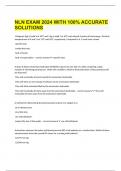
-
NLN EXAM 2024 WITH 100% ACCURATE SOLUTIONS
- Exam (elaborations) • 33 pages • 2024
-
Available in package deal
-
- $14.49
- + learn more
NLN EXAM 2024 WITH 100% ACCURATE SOLUTIONS 1 kilogram (kg) of solid X at 10°C and 1 kg of solid Y at 10°C each absorb 5 joules of heat energy. The final temperatures of X and Y are 15°C and 20°C, respectively. Compared to X, Y must have a lower specific heat. conductive heat. heat of fusion. heat of vaporization. - correct answer specific heat. A drop of dilute ammonium hydroxide (NH4OH) is placed on one side of a slide containing a large number of swimming paramecium. Under th...
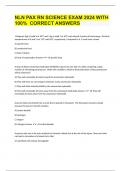
-
NLN PAX RN SCIENCE EXAM 2024 WITH 100% CORRECT ANSWERS
- Exam (elaborations) • 12 pages • 2024
-
- $16.49
- + learn more
1 kilogram (kg) of solid X at 10°C and 1 kg of solid Y at 10°C each absorb 5 joules of heat energy. The final temperatures of X and Y are 15°C and 20°C, respectively. Compared to X, Y must have a lower A) specific heat B) conductive heat C) heat of fusion D) heat of vaporization Answer - A) specific heat A drop of dilute ammonium hydroxide (NH4OH) is placed on one side of a slide containing a large number of swimming paramecium. Under this condition, which of these behaviors of the pa...

-
NLN Practice Questions and Answers with complete solution
- Exam (elaborations) • 33 pages • 2024
- Available in package deal
-
- $8.39
- + learn more
1 kilogram (kg) of solid X at 10°C and 1 kg of solid Y at 10°C each absorb 5 joules of heat energy. The final temperatures of X and Y are 15°C and 20°C, respectively. Compared to X, Y must have a lower specific heat. conductive heat. heat of fusion. heat of vaporization. - Answer-specific heat. A drop of dilute ammonium hydroxide (NH4OH) is placed on one side of a slide containing a large number of swimming paramecium. Under this condition, which of these behaviors of the paramecia wi...
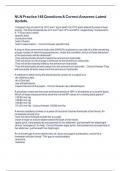
-
NLN Practice 148 Questions & Correct Answers-Latest Update.
- Exam (elaborations) • 22 pages • 2024
-
- $23.49
- + learn more
NLNPractice 148Questions&Correct Answers-Latest Update. 1 kilogram (kg) of solid X at 10°C and 1 kg of solid Y at 10°C each absorb 5 joules of heat energy. The final temperatures of X and Y are 15°C and 20°C, respectively. Compared to X, Y must have a lower specific heat. conductive heat. heat of fusion. heat of vaporization. - Correct Answer specific heat. A drop of dilute ammonium hydroxide (NH4OH) is placed on one side of a slide containing a large number of swimming paramecium....
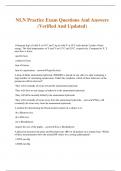
-
NLN Practice Exam Questions And Answers (Verified And Updated)
- Exam (elaborations) • 29 pages • 2024
- Available in package deal
-
- $13.49
- + learn more
NLN Practice Exam Questions And Answers (Verified And Updated) 1 kilogram (kg) of solid X at 10°C and 1 kg of solid Y at 10°C each absorb 5 joules of heat energy. The final temperatures of X and Y are 15°C and 20°C, respectively. Compared to X, Y must have a lower specific heat. conductive heat. heat of fusion. heat of vaporization. - answerspecific heat. A drop of dilute ammonium hydroxide (NH4OH) is placed on one side of a slide containing a large number of swimming paramecium. U...
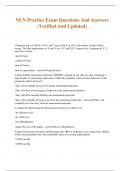
-
NLN Practice Exam Questions And Answers (Verified And Updated)
- Exam (elaborations) • 29 pages • 2024
- Available in package deal
-
- $13.49
- + learn more
NLN Practice Exam Questions And Answers (Verified And Updated) 1 kilogram (kg) of solid X at 10°C and 1 kg of solid Y at 10°C each absorb 5 joules of heat energy. The final temperatures of X and Y are 15°C and 20°C, respectively. Compared to X, Y must have a lower specific heat. conductive heat. heat of fusion. heat of vaporization. - answerspecific heat. A drop of dilute ammonium hydroxide (NH4OH) is placed on one side of a slide containing a large number of swimming paramecium. U...
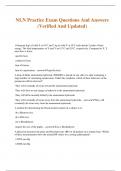
-
NLN Practice Exam Questions And Answers (Verified And Updated)
- Exam (elaborations) • 29 pages • 2024
- Available in package deal
-
- $13.49
- + learn more
NLN Practice Exam Questions And Answers (Verified And Updated) 1 kilogram (kg) of solid X at 10°C and 1 kg of solid Y at 10°C each absorb 5 joules of heat energy. The final temperatures of X and Y are 15°C and 20°C, respectively. Compared to X, Y must have a lower specific heat. conductive heat. heat of fusion. heat of vaporization. - answerspecific heat. A drop of dilute ammonium hydroxide (NH4OH) is placed on one side of a slide containing a large number of swimming paramecium. U...
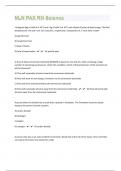
-
NLN PAX RN Science 50 Questions With Answers
- Exam (elaborations) • 13 pages • 2023
- Available in package deal
-
- $6.99
- + learn more
1 kilogram (kg) of solid X at 10°C and 1 kg of solid Y at 10°C each absorb 5 joules of heat energy. The final temperatures of X and Y are 15°C and 20°C, respectively. Compared to X, Y must have a lower A) specific heat B) conductive heat C) heat of fusion D) heat of vaporization - ️️A) specific heat A drop of dilute ammonium hydroxide (NH4OH) is placed on one side of a slide containing a large number of swimming paramecium. Under this condition, which of these behaviors of the par...
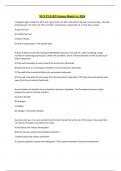
-
NLN PAX RN Science Rated A+ 2024
- Exam (elaborations) • 11 pages • 2024
-
- $9.49
- + learn more
NLN PAX RN Science Rated A+ 2024 1 kilogram (kg) of solid X at 10°C and 1 kg of solid Y at 10°C each absorb 5 joules of heat energy. The final temperatures of X and Y are 15°C and 20°C, respectively. Compared to X, Y must have a lower A) specific heat B) conductive heat C) heat of fusion D) heat of vaporization A) specific heat A drop of dilute ammonium hydroxide (NH4OH) is placed on one side of a slide containing a large number of swimming paramecium. Under this condition, w...
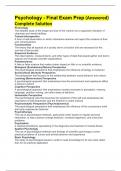
-
NLN Pax Science Practice Test
- Exam (elaborations) • 11 pages • 2024
-
Available in package deal
-
- $10.99
- + learn more
NLN Pax Science Practice Test Specific heat 1 kilogram (kg) of solid X at 10°C and 1 kg of solid Y at 10°C each absorb 5 joules of heat energy. The final temperatures of X and Y are 15°C and 20°C, respectively. Compared to X, Y must have a lower a.) specific heat. b.) conductive heat c.). heat of fusion d.). heat of vaporization. They will eventually all swim away from the ammonium hydroxide is the correct answer A drop of dilute ammonium hydroxide (NH4OH) is placed on one side of a ...

That summary you just bought made someone very happy. Also get paid weekly? Sell your study resources on Stuvia! Discover all about earning on Stuvia


